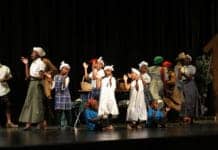by The People’s Minister of Information JR
One of the most informative ways that a family can celebrate the so-called holiday season without celebrating the Roman fertility holiday Saturnalia, which Roman Catholics renamed Christmas, is to remember the struggle our ancestors had to go through over hundreds of years in this blood soaked New World called the United States, including during their holiday season.

I urge all freedom loving conscious minds to go check out this play, which will be at the Malonga Casquelord Center, 1428 Alice St. in downtown Oakland, on Saturday, Dec. 21, at 3 p.m. and 7 p.m. and on Sunday, Dec. 22, at 3 p.m. Until then, here is Taiwo in her own words …
M.O.I. JR: Can you talk about what inspired you to write this play? How long have you been writing plays?
Taiwo: I’ve been writing plays for about six years now. When I began researching Spirituals, I knew that I wanted to create a stage show that educated people about how the songs were used functionally, on and around the plantation, by the people who were enslaved. So my initial concept was much broader than the content of this production. Then, after learning about the escape when Harriet Tubman went back to Maryland to rescue her brothers, I knew that this story was the vehicle through which I would tell that broader story about Spirituals.
I urge all freedom loving conscious minds to go check out this play, which will be at the Malonga Casquelord Center, 1428 Alice St. in downtown Oakland, on Saturday, Dec. 21, at 3 p.m. and 7 p.m. and on Sunday, Dec. 22, at 7 p.m.
M.O.I. JR: What inspired your interest in Negro Spirituals? What are Negro Spirituals? Why is it important to remember this history?
Taiwo: Spirituals are the songs created by enslaved African Americans in the parts of the country where slavery was legal during the Antebellum era. Most Spirituals have Biblical themes. Thus, they were mistakenly classified as religious music. As a result of that, many Spirituals can now be found in hymnals and are sung in churches all over the world to this day.
However, having been told at a young age that Spirituals contained coded messages, I wanted to find out how pervasive this coding was. Additionally, I wanted to decode these songs to find out exactly what was being communicated. So that is what I set out to find, and through using several sources, I put together a list of common code words that can be used to decode most Spirituals. We cover many of these code words in “Go Tell It! – A Harriet Tubman Christmas Story.”
I also include a more extensive list, and a line by line decoding of the Spirituals sung in the show in my soon-to-be-released book, also entitled “Go Tell It!”

The fact of the matter is that many plantation owners did not want the people they were enslaving introduced to Christianity for the simple fact that the Old Testament is full of accounts where the “underdog” is victorious. Not only that, the teachings of Jesus taught obedience to God and NOT those in political power, which is not the message plantation owners wanted taught.
Additionally, the historical record is full of accounts of overt and covert forms of resistance. Furthermore, enslaved Blacks still practiced very African traditions, customs and rituals – just within a new context. For example, over 85 percent of Spirituals were sung in what is called a Ring Shout. Ring Shouts duplicate many traditional West African spiritual rituals where people sing praise songs while shuffling in a counter-clockwise circle at an increasing tempo, often for hours on end, until a spiritual possession takes place.
So, in thinking critically, I knew there has to be more under the surface of the appearance of Christian conversion. What is under this surface is resistance to slavery through singing coded messages of escape.
The next reason remembering this history is important is a matter of faith and inspiration. Enslaved New Africans were able to overcome seemingly insurmountable odds in surviving, and escaping from, slavery. They were able to do so because they believed they would, in spite of the fact that those in power did everything they could to break their spirits and scare them into submission.
My ongoing mantra is that if my ancestors could accomplish all that they did in the face of that oppression, I can surely accomplish ANYTHING I set my mind to.
I knew there has to be more under the surface of the appearance of Christian conversion. What is under this surface is resistance to slavery through singing coded messages of escape.
Finally, Spirituals are a wonderful display of the creative genius of African people. This beautiful art was born out of oppression. Generations after the 13th Amendment outlawed slavery in the United States, Spirituals flourish. They are sung by the concert chorales of every Historically Black College and University in this country, by opera singers, gospel artists and in churches all over the world.
There is a legacy of generations of African American composers who arrange Spirituals for performance by solo artists, groups and choral ensembles. Spirituals have even inspired the compositions of composers of other races and nationalities. They are an important part of the musical landscape of this country.
My ongoing mantra is that if my ancestors could accomplish all that they did in the face of that oppression, I can surely accomplish ANYTHING I set my mind to.
M.O.I. JR: What is the connection between Harriet Tubman and Negro Spirituals?
Taiwo: Harriet Tubman was an heir to the tradition of singing to convey messages of escape. In fact, before her first successful escape, she walked past a kitchen window of the big house singing a Spiritual to alert her friend of her impending departure. She sang, “I’m boun’ for de promised land, Frien’s, I’m gwine to lebe you … I’ll meet you in de mornin’, when you reach de promised land, on de oder side of Jordan, for I’m boun’ for de promised land.” On escapes with Underground Railroad passengers, she would also sing certain songs when they were in hiding to let them know when it was unsafe or safe to come out of their hiding places.
M.O.I. JR: For people who are not interested in celebrating a traditional white Christmas or Saturnalia, why is this the play for them?
Taiwo: This particular escape happened on Christmas day in 1854, which is why we perform the play annually on the weekend before Christmas. So, for those actually celebrating Christmas as the observance of the birth of Jesus (not the observance of spending money to save corporations from the monetary losses they have incurred all year up until Black Friday), this show is the perfect addition to holiday activities, since it is a historically accurate retelling of what can be accomplished when you put your faith in God and not in man.

M.O.I. JR: What was last year’s production of “Go Tell It” like? How has this year’s production changed? Can you talk about some of the added or deleted scenes and why you chose new scenes over older scenes?
Taiwo: Last year’s production was narrated by an African village griot, played by my mother and actual griot, Phavia Kujichagulia. The narration has been replaced by Sarah Bradford interviewing an older Harriet Tubman. Sarah Bradford was the white woman who interviewed Harriet Tubman and wrote a biography about her during her lifetime. Thus, their conversation narrates the show.
In these conversations we see flashbacks to different periods during Harriet Tubman’s life. So we have a younger Harriet character as well that is seen during these flashbacks. We also have an added scene between Harriet and her husband, John Tubman.
I received feedback from last year’s show that people wanted to know more about Harriet Tubman’s personal backstory, so that is what has been added in.
Most of the songs we sing are the same. A few have been deleted and a couple added in order to match the action of the added scenes. Other than that, however, the show is similar to last year’s show.
For anyone interested in learning about the history of the time period, Harriet Tubman, the Underground Railroad and/or Spirituals, this is the show to come see.
M.O.I. JR: How do you feel about bringing “Go Tell It” to the Malonga Center?
Taiwo: It’s wonderful to have the show at the Malonga Casquelourd Center this year. The change has given us the space we need to expand and to bring the show to wider audiences without tiring out my cast by adding additional shows. Also, it’s nice to be in the historical building that houses so many wonderful performing arts companies. It’s a blessing.
M.O.I. JR: How could people get tickets? How could people stay in touch with your work as a playwright?
Taiwo: People can get tickets by visiting our website at www.gotellit.info. Also, feel free to email me at info@gotellit.info.
The People’s Minister of Information JR Valrey is associate editor of the Bay View, author of “Block Reportin’” and filmmaker of “Operation Small Axe” and “Block Reportin’ 101,” available, along with many more interviews, at www.blockreportradio.com. He can be reached at blockreportradio@gmail.com.
http://youtu.be/yfncfy5vRSQ

 Store
Store







